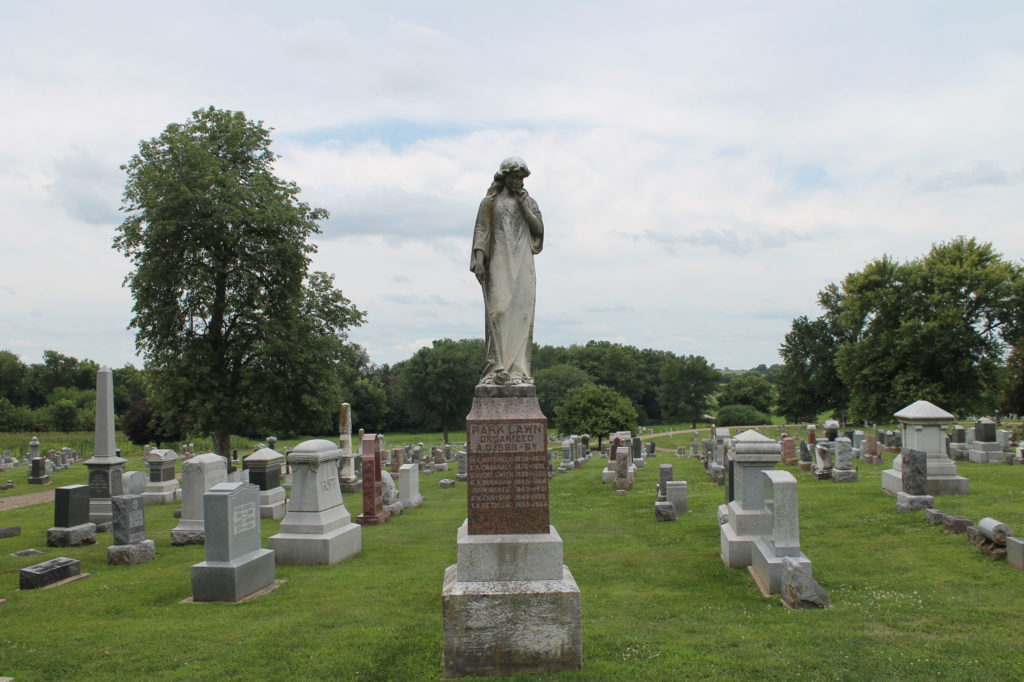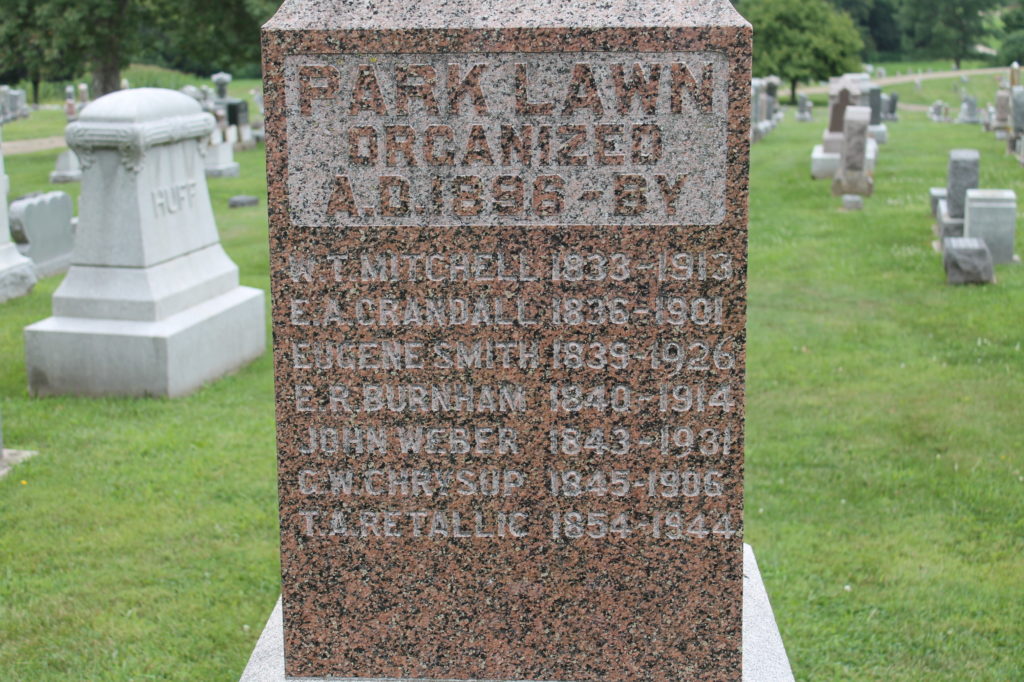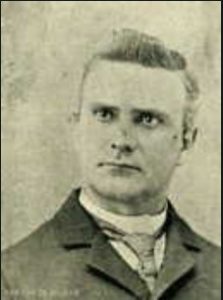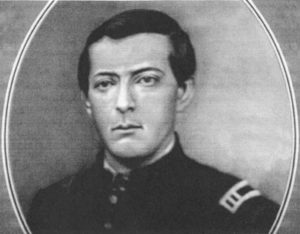Directions
From the intersection of Rogers & Main make a right onto Main, the cemeteries will be on your left and right at the edge of town.

The Cemetery was incorporated into the city of Barry in April of 1896 by Edwin A. Crandall, John Weber, T. A. Retallic, George W. Chrysup, E. R. Burnham, W. T. Mitchell, and Eugene Smith.
Edwin A. Crandall, first president of the cemetery board of directors suggested the name Park Lawn. The suggested name was so liked by the other board members that it was adopted. Crandall was also elected to the office of President, T. A. Retallic served a dual role as Secretary and Superintendent. This dual appointment of Retallic may have come from the fact that he operated the Barry Marble Works on the south side of the town square and that his business would be supplying most of the gravestones in the new cemetery.
For twenty-nine years the above-mentioned members humbly took care of Park Lawn. But as members passed away and the others entered the later years of their lives, they came to realize that a change was needed. On January 20, 1925, the Park Lawn Cemetery Association was formed under new management.
The association allowed for the election of a Superintendent who would be the caretaker of the cemetery. One of the first items of business was to pass rules and regulations governing Park Lawn.

Care of Cemetery
- Park Lawn will be a perpetual care cemetery.
- All entrances and exits will be through the north gate.
- Loud indecent or profane language is not allowed.
- Firearms are prohibited except for a military funeral.
- Writing upon any monument, fence or structure is prohibited.
- The planting of any shrub, plant or flower is not allowed without permission.
- The pruning or removal of any shrub, plant or flower is not allowed without permission.
- No wooden benches, chairs, settees, headboards, or other articles are allowed.
- All burial lots are exempt from taxation and from liability for private indebtedness.
- No work will be performed within the cemetery on Sunday except for the opening and closing of graves.
- All trash and other material must be removed by Saturday noon.
- Only the Superintendent will be responsible for the selling, deed recording, opening, and closing of graves.
The cemetery had a fee schedule for opening graves. Infant $4.00; child up to eight years of age $5.00; and adult five feet deep $9.00 and an additional $2.00 if a vault is used. Any bill not paid for lots or graves shall draw 6% interest after 90 days of service.
All foundations for monuments and markers had to be improved and built by the association at the expense of the lot or grave owner. The association had an established size and fee schedule for the foundations. 20 inches by 8 inches by 3 feet deep $5.00. 22 inches by 10 inches by 3 ½ feet deep $6.00. 2 feet by 3 feet by 4 feet deep $7.50. All foundations were to be 2-3 inches wider than the monument. All monuments will be made of granite and be a minimum of six inches wide.
Historical Figures
Edwin Alonzo Crandall
Edwin Alonzo Crandall was born August 18, 1836, in Berlin, Rensselaer County, New York. He was the son of Joshua Greene and Fanny Burdick Crandall. Edwin’s father was a hatter, a tanner of hides and a shoemaker. At the age of three Edwin came to Illinois in 1839 settling in Barry, Pike County, Illinois.
Edwin’s early education was in the early pioneer schools of Barry. At age 14 he began to work as a mercantile clerk until he was seventeen at which time he entered Shurtleff College in Alton, Illinois. Shurtleff was a Baptist college founded in 1827 under the name Rock Spring Seminary. By 1832 it was known as the Alton Seminary and later changed to Shurtleff in 1836. In the late 1950s it became part of Southern Illinois University.
After graduation Edwin returned to Barry where he entered into a partnership with Lewis Angle. Angle & Crandall, as the business was known, specialized in mercantile and pork packing. After three years Edwin sold his interest and headed east to Washington, D.C. to attend Columbia College. While attending college Edwin also read law with Sidney Smith Baxter, former Attorney General of Virginia. Baxter was a Democrat and served from 1834-1852.
When he completed his studies Edwin returned to Barry where he once again formed a partnership with Lewis Angle in the mercantile and pork packing business. In 1860 he married Eliza F. Hurt in Pike County, Illinois. Their marriage would only last a few years ending with the death of Eliza in 1867. Eliza would give birth to a son Charles Edwin born in 1863 and dying in 1864. A daughter Fannie Lee was born in 1864 and lived until 1941.
In 1862 as the American Civil War raged, Edwin sold his interest and set to work raising a Company of men from the Barry area. Edwin’s Company would become Company D of the Ninety-Ninth Illinois Regiment. As the regiment formed, elections were held for regimental officers. Edwin was elected and commissioned major of the regiment. He was 27 years of age when he enlisted and was officially sworn in on August 23, 1862, at Florence, Pike County, Illinois.
On May 22, 1863, Major Crandall assaulted the Confederate works with his regiment. At one point of the assault Sergeant William Sitton who was part of the regimental color guard and carrying the regimental flag was shot in the side and went down. Unable to go on, Sitton passed the flag to Major Crandall to move it forward. Shortly after taking the flag Major Crandall was wounded in the foot and had to leave the flag behind on the battlefield. Major Crandall resigned from the army on October 9, 1863.
After his time in the army, he returned home where he entered a business partnership in a woolen mill. Along with the mill he spread his interests into the grocery business and selling woolen products for eight years. On August 15, 1870, he married his second spouse Jennie Gordon in Pike County. One son Louis Edwin was born on November 15, 1873.
In 1882 Edwin’s interest turned to banking. In 1884 he opened the Barry Milling Co. followed by the building of the Barry Flouring Mills. In addition to his business interests Edwin found time for public service. He served on the Barry Township Board of Supervisors, City Board of Barry for twelve years, Board of Education and Mayor of Barry. He was one of the original founding members of the Park Lawn Cemetery Association. He started his early life as a Democrat voting for Stephen A. Douglas but later turned his politics to Republican. Edwin Alonzo Crandall passed away on August 21, 1901 and was laid to rest here in the cemetery he helped create.
Thomas A. Retallic
Thomas A. Retallic was born in Straitsville, Perry County, Ohio on March 30, 1854. He was the son of Francis Retallic and Catherine Fielty. His father had been born in England and had come to America in 1850 settling in Zanesville, Ohio where he became a coal miner. Catherine was a native of Ireland. When the American Civil War began Francis enlisted in the 122nd Ohio Infantry. He was wounded and recovered but in July of 1864 he became sick with fever and died at City Point, Virginia.
Thomas’s early education was in the public schools in Ohio. At age sixteen he left his mother’s home in Lexington, Ohio and moved to Washington Courthouse, Ohio where he began to learn the trade of farming to support his mother. After about two years Thomas returned to Lexington where he became an apprentice learning how to cut stone and marble. After three years he moved to St Louis, Missouri for one year before moving north in the spring of 1877 and settling in Barry, Pike County, Illinois.
Thomas was an ambitious businessman. Not only was he the proprietor of the Barry Marble Works, but he also finished the Barry Hotel and established the Barry Real Estate Company and the Barry Cement Construction Company. He also served as the first superintendent of Park Lawn Cemetery. His marble company would make many of the monuments for Park Lawn.
He was a member of the Masonic Fraternity, and the Woodsman of America. He served as Mayor of Barry, town alderman, township trustee and started and served as president of the First National Bank of Barry. In 1899-1900 he represented his district in the Illinois General Assembly.
Thomas A. Retallic passed away on December 26, 1944. He was laid to rest in this beautiful cemetery that he helped lay out.
George Wellington Chrysup
George Wellington Chrysup was born in Florence, Pike County, Illinois on February 1, 1845. He was the son of William L. and Jane Ann Barney Chrysup. His parents had come to Pike County in 1826 where they stayed until 1850. Leaving young George behind, they ventured across the prairies and mountains to California where they stayed until 1857 at which time, they started the journey back to Pike County. On April 24, 1859, the Chrysup’s were on board the steamboat St Nicholas about one and half miles below Helena, Arkansas when the boat exploded killing both William and Jane.
At age fourteen George found himself an orphan. He was taken in by his maternal grandfather Colonel Benjamin Barney. Colonel Barney had been born in Massachusetts in 1795, where he lived until he relocated to Huron County, Ohio in March of 1817. Over the next years he worked as a farm hand until 1825 when he moved west to Illinois. His first stop was in Shawneetown, Illinois until moving to Atlas in 1826.
Benjamin Barney ran one of the first blacksmith shops in the area which made his services invaluable. He was the first to burn coal which had been mined and brought west from Pittsburgh, Pennsylvania. He was a veteran of the Black Hawk War serving in the Second Illinois Mounted Riflemen.
At age seventeen George answered Lincoln’s call for 75,000 troops to enlist for 90 days in the 10th Illinois Infantry. After his 90 days were up, he enlisted in Company B, 28th Illinois Infantry for 3 years of service. By the end of the war, he was performing the duties of Captain of Company B but because he was never officially sworn in at the higher rank he was discharged as a 1st lieutenant.
After the war George returned to his home near Barry where on April 18, 1867, he married Katie Harvey. In the years following he farmed and ran a mercantile business specializing in groceries and hardware. He served as postmaster and justice of the peace. His political alignment was always Republican. George was active in the John McTucker Grand Army of the Republic Post #154 in Barry.
George Wellington Chrysup passed away on December 1, 1906, and was laid to rest in Park Lawn.


